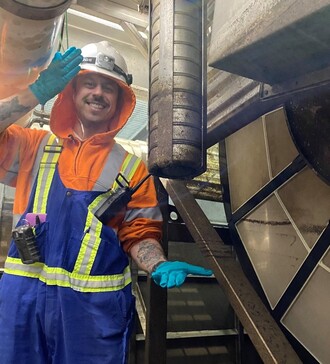Working in the Industry: The Rory Porter Story

After working as a journeyman electrician, Rory Porter was looking for a change. At the recommendation of a friend, he chose to purse a career in the water/wastewater industry.
Now working with the Town of Banff Wastewater Treatment Plant, he shares his journey into the field, an inside look at the working conditions and day-to-day responsibilities of an operator and advice to those thinking about getting started in water/wastewater.
Rory Porter performing preventative maintenance.
Why did you choose a career in water/wastewater?
I chose a career in water/wastewater mainly because I really wanted to work for a municipality. I wanted to be a public servant, and to have a job that provided stability and good benefits. Taking into consideration the four disciplines, there is plenty of career paths you can take in this industry.
How did you get started in the water/wastewater industry?
Prior to working in the wastewater industry, I was working as a journeyman electrician for about 7 years. I was working out of town for the better part of those years and thinking about making a change to find something more stable. I took some time off to travel, bartend and think about my options. I had a friend that was working in the water industry and suggested it might be a change I would enjoy.
When the pandemic happened, I took it as an opportunity to go back to school. I enrolled in SAIT’s Water and Wastewater Treatment Operations program. It was a 1-year program that also included 4th Class Power Engineering. I was able to do my practicum with EPCOR in Canmore, and by the end of the summer I was lucky to find a fulltime job with the Town of Banff. I’ve been working with the Town of Banff at the wastewater treatment plant for almost 2 years now and have been enjoying it ever since.
What are the working conditions like?
The working conditions are pretty good. We are working 10-hour days but only 4 days a week. I would consider it light physical work when doing maintenance. We are also provided with safety training to be able to safely work in certain conditions such as confined spaces, at heights, and around gasses. One memorable job for me was having the pleasure of scrubbing the aeration diffusers at the bottom of the bioreactor.
What do you typically do in a day?
A typical day can include doing daily checks/maintenance around the plant, dewatering, and doing lab tests. As seen in my picture, this day we were doing some preventative maintenance cleaning the suction inlet of the disk filters. Good times!
What do you like about working in the industry?
I like that we are working in an industry that is trying to make a positive impact on the environment and maintain public safety. I also like the job stability this industry provides and that it encourages continuing education. This field of work also offers growth potential which is important to me. Since being at the Banff WWTP, I’ve written and passed my Level I & II Wastewater Treatment certification exams. There is no shortage of learning in this industry and it’s exactly what I was seeking with my career change.
What advice can you give someone whose interested in working in water/wastewater?
I would suggest doing some research into the different disciplines you can work in. When I was still a student, I was unsure which discipline to enter. It was helpful to me when I arranged a tour at the Banff WWTP to get an idea of the day-to-day tasks and what it would be like working in that environment. My advice would be to reach out to different municipalities to arrange tours. Plant staff are usually very keen and take pride in showcasing their facilities.
If you're interested in pursuing a career in the water/wastewater industry and looking for more information, check out these resources: